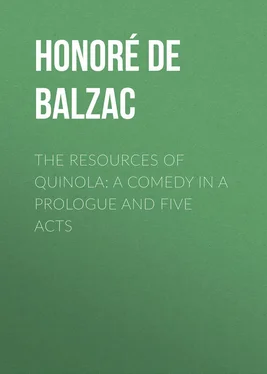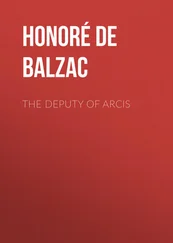Honoré Balzac - The Resources of Quinola - A Comedy in a Prologue and Five Acts
Здесь есть возможность читать онлайн «Honoré Balzac - The Resources of Quinola - A Comedy in a Prologue and Five Acts» — ознакомительный отрывок электронной книги совершенно бесплатно, а после прочтения отрывка купить полную версию. В некоторых случаях можно слушать аудио, скачать через торрент в формате fb2 и присутствует краткое содержание. Жанр: literature_19, foreign_antique, foreign_prose, на английском языке. Описание произведения, (предисловие) а так же отзывы посетителей доступны на портале библиотеки ЛибКат.
- Название:The Resources of Quinola: A Comedy in a Prologue and Five Acts
- Автор:
- Жанр:
- Год:неизвестен
- ISBN:нет данных
- Рейтинг книги:3 / 5. Голосов: 1
-
Избранное:Добавить в избранное
- Отзывы:
-
Ваша оценка:
- 60
- 1
- 2
- 3
- 4
- 5
The Resources of Quinola: A Comedy in a Prologue and Five Acts: краткое содержание, описание и аннотация
Предлагаем к чтению аннотацию, описание, краткое содержание или предисловие (зависит от того, что написал сам автор книги «The Resources of Quinola: A Comedy in a Prologue and Five Acts»). Если вы не нашли необходимую информацию о книге — напишите в комментариях, мы постараемся отыскать её.
The Resources of Quinola: A Comedy in a Prologue and Five Acts — читать онлайн ознакомительный отрывок
Ниже представлен текст книги, разбитый по страницам. Система сохранения места последней прочитанной страницы, позволяет с удобством читать онлайн бесплатно книгу «The Resources of Quinola: A Comedy in a Prologue and Five Acts», без необходимости каждый раз заново искать на чём Вы остановились. Поставьте закладку, и сможете в любой момент перейти на страницу, на которой закончили чтение.
Интервал:
Закладка:
Honoré de Balzac
The Resources of Quinola: A Comedy in a Prologue and Five Acts
AUTHOR'S PREFACE
Had the author of the following play written it merely for the purpose of winning for it the universal praise which the journals have lavished upon his romances, and which perhaps transcended their merits, The Resources of Quinola would still have been an excellent literary speculation; but, when he sees himself the object of so much praise and so much condemnation, he has come to the conclusion that it is much more difficult to make successfully a first venture on the stage than in the field of mere literature, and he has armed himself, accordingly, with courage, both for the present and for the future.
The day will come when the piece will be employed by critics as a battering ram to demolish some piece at its first representation, just as they have employed all his novels and even his play entitled Vautrin , to demolish The Resources of Quinola .
However tranquil may be his mood of resignation, the author cannot refrain from making here two suggestive observations.
Not one among fifty feuilleton writers has failed to treat as a fable, invented by the author, the historic fact upon which is founded the present play.
Long before M. Arago mentioned this incident in his history of steam, published in the Annuaire du Bureau des Longitudes , the author, to whom the incident was known, had guessed in imagination the great drama that must have led up to that final act of despair, the catastrophe which necessarily ended the career of the unknown inventor, who, in the middle of the sixteenth century, built a ship that moved by steam in the harbor of Barcelona, and then scuttled it with his own hands in the presence of two hundred thousand spectators.
This observation is sufficient answer to the derision which has been flung upon what was supposed to be the author's hypothesis as to the invention of steam locomotion before the time of the Marquis of Worcester, Salomon de Caus and Papin.
The second observation relates to the strange manner in which almost all the critics have mistaken the character of Lavradi, one of the personages in this comedy, which they have stigmatized as a hideous creation. Any one who reads the piece, of which no critic has given an exact analysis, will see that Lavradi, sentenced to be transported for ten years to the presides , comes to ask pardon of the king. Every one knows how freely the severest penalties were in the sixteenth century measured out for the lightest offences, and how warmly valets in a predicament such as Quinola's, were welcomed by the spectators in the antique theatres.
Many volumes might be filled with the laments of feuilletonists, who for nearly twenty years have called for comedies in the Italian, Spanish or English style. An attempt has been made to produce one, and the critics would rather eat their own words than miss the opportunity of choking off the man who has been bold enough to venture upon a pathway of such fertile promise, whose very antiquity lends to it in these days the charm of novelty.
Nor must we forget to mention, to the disgrace of our age, the howl of disapprobation which greeted the title "Duke of Neptunado," selected by Philip II. for the inventor, a howl in which educated readers will refuse to join, but which was so overwhelming at the presentation of the piece that after its first utterance the actors omitted the term during the remainder of the evening. This howl was raised by an audience of spectators who read in the newspapers every morning the title of the Duke of Vittoria, given to Espartero, and who must have heard of the title Prince of Paz, given to the last favorite of the last but one of the kings of Spain. How could such ignorance as this have been anticipated? Who does not know that the majority of Spanish titles, especially in the time of Charles V. and Philip II. refer to circumstances under which they were originally granted?
An admiral took that of Transport-Real , from the fact that the dauphin sailed with him to Italy.
Navarro was given the title La Vittoria after the sea-fight of Toulon, though the issue of the conflict was indecisive.
These examples, and as many others, are outdone by that of the famous finance minister, a parvenu broker, who chose to be entitled the Marquis Insignificant (l'Ensenada).
In producing a work, constructed with all the dramatic irregularity of the early French and Spanish stage, the author has made an experiment which had been called for by the suffrages of more than one "organ of public opinion," as well as of all the "first-nighters" of Paris. He wished to meet the genuine public and to have his piece represented in a house filled with a paying audience. The unsatisfactory result of this ordeal was so plainly pointed out by the whole press, that the indispensability of claqueurs has been now forever established.
The author had been confronted by the following dilemma, as stated by those experienced in such matters. If he introduced into the theatre twelve hundred "dead heads," the success secured by their applause would undoubtedly be questioned. If twelve hundred paying spectators were present, the success of the piece was almost out of the question. The author chose to run the risk of the latter alternative. Such is the history of this first representation, where so many people appeared to be made so uncomfortable by their elevation to the dignity of independent judges.
The author intends therefore to return to the beaten track, base and ignoble though it be, which prejudice has laid out as the only avenue to dramatic success; but it may not be unprofitable to state here, that the first representation of The Resources of Quinola actually redounded to the advantage of the claqueurs , the only persons who enjoyed any triumph in an evening entertainment from which their presence was debarred!
Some idea of the criticism uttered on this comedy may be gained from the fact that out of the fifty newspapers, all of which for the last twenty years have uttered over the unsuccessful playwright the hackneyed phrase, "the play is the work of a clever man who will some day take his revenge," not one employed it in speaking of The Resources of Quinola , which they were unanimous in consigning to oblivion. This result has settled the ambition of the author.
Certain persons, whose good auguries the author had done nothing to call forth, encouraged from the outset this dramatic venture, and thus showed themselves less critical than unkind; but the author counts such miscalculations as blessings in disguise, for the loss of false friends is the best school of experience. Nor is it less a pleasure than a duty thus publicly to thank the friends, like M. Leon Gozlan, who have remained faithful, towards whom the author has contracted a debt of gratitude; like M. Victor Hugo, who protested, so to speak, against the public verdict at the first representation, by returning to witness the second; like M. de Lamartine and Madame de Girardin, who stuck to their first opinion, in spite of the general public reprobation of the piece. The approval of such persons as these would be consoling in any disaster.
LAGNY, 2 April, 1842.
PERSONS OF THE PROLOGUE
Philip II., King of Spain
Cardinal Cienfuegos, Grand Inquisitor
The Captain of the Guards
The Duke of Olmedo
The Duke of Lerma
Alfonso Fontanares
Lavradi, known as Quinola
A halberdier
An alcalde of the palace
A familiar of the Inquisition
The Queen of Spain
The Marchioness of Mondejar
PERSONS OF THE PLAY
Don Fregose, Viceroy of Catalonia
Читать дальшеИнтервал:
Закладка:
Похожие книги на «The Resources of Quinola: A Comedy in a Prologue and Five Acts»
Представляем Вашему вниманию похожие книги на «The Resources of Quinola: A Comedy in a Prologue and Five Acts» списком для выбора. Мы отобрали схожую по названию и смыслу литературу в надежде предоставить читателям больше вариантов отыскать новые, интересные, ещё непрочитанные произведения.
Обсуждение, отзывы о книге «The Resources of Quinola: A Comedy in a Prologue and Five Acts» и просто собственные мнения читателей. Оставьте ваши комментарии, напишите, что Вы думаете о произведении, его смысле или главных героях. Укажите что конкретно понравилось, а что нет, и почему Вы так считаете.












